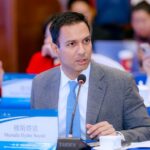ISLAMABAD, Pakistan: The Minister for Defence & Foreign Affairs Engineer Khurram Dastgir Khan has said that we have navigated successfully through turbulent waters, and have achieved measurable success through a “regional recalibration” of our foreign policy.
While briefing media along with the Foreign Office Spokesperson Dr. Muhammad Faisal on “Pakistan’s Foreign Policy – 2013-2018 Challenges, Successes and Future Direction” in Islamabad on Thursday, Dastgir said that these past five years, we have been faced with numerous challenges emanating from a difficult strategic environment, unprecedented flux in our geopolitical context, and our fight against terrorism and extremism.
The minister said that in last five years, we endeavoured to forge closer and better relations with countries in our neighbourhood, and the world at large.
“Our aim was to promote economic connectivity, strengthen partnerships, expand Pakistan’s diplomatic space, and raise our international profile; while simultaneously serving our diaspora the world over, and safeguarding its interests as well,” he said.
While highlighting seven notable landmarks achieved in last five year by the outgoing government, the minister said that they further strengthened and deepened Pakistan’s relations with the People’s Republic of China. He said that China has always been the anchor of our foreign policy, adding that Sino-Pak friendship has no parallels in the annals of history.
The foreign minister said that the launch and quick progress on the China-Pakistan Economic Corridor (CPEC), the flagship project of President Xi Jinping’s Belt and Road Initiative, has been a landmark achievement. He said that it is a measure of success of our foreign policy that we are now poised to translate our geostrategic location into a geo economic asset.
“CPEC is forging ahead with full steam,” he said, adding that the project has attracted investments of $46.6 billion and has put Pakistan squarely at the centre of a blueprint for a more hopeful, prosperous, and connected future for the region and the world.
The minister said that Pakistan successfully hosted after a gap of nearly 72 years, the 13th ECO Summit in Islamabad in March 2017 and assumed Chairmanship of ECO for the ensuing year.
Dastgir further said that Pakistan’s formal accession to the Shanghai Cooperation Organization (SCO) as a full member marks our entry into the largest club of nations in terms of size of populations, geographic expanse, and quantum of resources.
“This was a breakthrough we managed to achieve 12 years after assuming observer status in the SCO, and some 18 years after its founding,” he said.
The foreign minister said that for the first time in history, we created and reinforced a historically unprecedented opening in relations with the Russian Federation. He said that we have developed mutual understandings and coordinated closely on issues of mutual concern.
“This relationship today has the potential to blossom into a multifaceted partnership,” he added.
Likewise, he said that continued engagement and strengthening of our relations with our traditional partners and allies in the Middle East.
The minister said that today, our relations with Saudi Arabia, Turkey, and Iran, among others, remain robust and continue to evolve.
“Our partnerships with the Gulf States remain vibrant and mutually rewarding,” he said.
Moreover, he said that it is a measure of success of our economic diplomacy that Pakistan was able to attain the GSP Plus Status in 2014 for 10 years, the widest and longest trade facilitation in Pakistan’s history.
“We have sustained it successfully ever since, delivering a 38% increase in Pakistan’s exports to the European Union,” Dastgir said.
Khurram Dastgir said that Pakistan continued to maintain a high profile and lead role in international forums including the United Nations. He said that we remained a lead contributor to UN’s global peacekeeping and peace building missions.
“It is a measure of our recognition and acknowledgment of our efforts that Pakistan has recently won elections to three important UN bodies: The Human Rights Council, ECOSOC’s Committee on NGOs, and to the UNICEF Executive Board,” the foreign minister said. “Out of 30 elections we contested between 2013-2018, we won 27.”





